

The Collective School Garden Network. School Gardening 101. Activities. Back to the Lessons Homepage Short, stand-alone lessons.
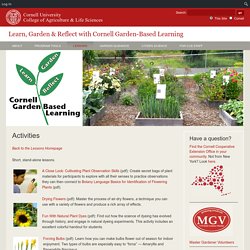
A Close Look: Cultivating Plant Observation Skills (pdf): Create secret bags of plant materials for participants to explore with all their senses to practice observations they can then connect to Botany Language Basics for Identification of Flowering Plants (pdf). Drying Flowers (pdf): Master the process of air-dry flowers, a technique you can use with a variety of flowers and produce a rich array of effects. Fun With Natural Plant Dyes (pdf): Find out how the science of dyeing has evolved through history, and engage in natural dyeing experiments. Forcing Bulbs (pdf): Learn how you can make bulbs flower out of season for indoor enjoyment. Forcing Twigs (pdf): Discover how spring flowering trees and shrubs can be forced into bloom after they have completed their winter dormancy requirement. Grapevine Wreaths (pdf): A perfect fall activity – collect grapevines and create holiday wreathes with different themes.
Lesson Plans. Free Lesson Plans Biomes Biome Survival Grade: 3–5 Learn about climate by creating a survival gear list for each world biome.
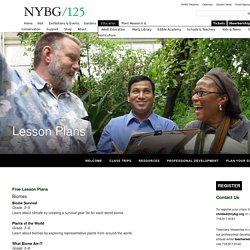
Plants of the World Grade: 3–8 Learn about biomes by exploring representative plants from around the world. What Biome Am I? Grade: 3–8 Predict the biome type through observation of images, rainfall, and temperature. Deserts Acting Like a Cactus Grade: pK–2 Act out the way that a cactus swells with rain and shrinks with drought. Pleated Plants Grade: pK–2 Learn the pleated structure of a cactus by creating a paper model. The New York Botanical Garden. Fun With Flowers In this lesson, students will: learn about the basic parts of a flower (petals, pollen, nectar, sepal, fruit, bud, seeds).
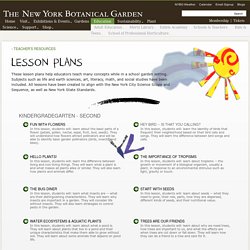
They will understand how flowers attract pollinators and will be able to identify basic garden pollinators (birds, insects, and bees). Hello Plants! In this lesson, students will: learn the difference between living and non-living things. They will learn what a plant is and what makes all plants alike or similar. The Bug Diner In this lesson, students will: learn what insects are -- what are their distinguishing characteristics. Water Ecosystems & Aquatic Plants In this lesson, students will: learn about what a pond is. What's the Weather? In this lesson, students will: learn about weather, climate and seasons and their impact on the garden -- what plants we plant and when we plant them and how plants grow depending on the weather. Hey Bird -- Is That You Calling? The Importance of Tropisms Start With Seeds Trees Are Our Friends What's It Like to be a Tree?
Eat Your 5-A-Day With The Incredible Edibles. Cornell Garden Based Learning. Search for Resources. School Garden Curriculum. Teacher Resources : School Garden Resources : Curriculum These lessons use gardens to teach a wide range of topics from grades K-8.
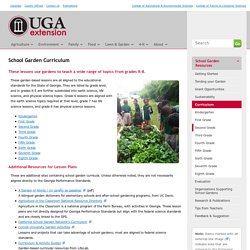
These garden-based lessons are all aligned to the educational standards for the State of Georgia. They are listed by grade level, and in grades K-5 are further subdivided into earth science, life science, and physical science topics. Grade 6 lessons are aligned with the earth science topics required at that level, grade 7 has life science lessons, and grade 8 has physical science lessons. Additional Resources for Lesson Plans These are additional sites containing school garden curricula. A Garden of Words / Un jardÃn de palabras (pdf) A bilingual garden dictionary for elementary schools and after-school gardening programs, from UC Davis. Lesson Plans. Great lesson plans make any new classroom project a cinch!
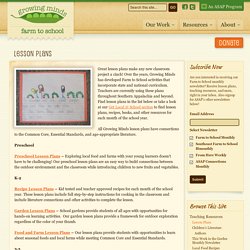
Over the years, Growing Minds has developed Farm to School activities that incorporate state and national curriculum. Teachers are currently using these plans throughout Southern Appalachia and beyond. Find lesson plans in the list below or take a look at our Get Local @ School section to find lesson plans, recipes, books, and other resources for each month of the school year. All Growing Minds lesson plans have connections to the Common Core, Essential Standards, and age-appropriate literature. Preschool Preschool Lesson Plans – Exploring local food and farms with your young learners doesn’t have to be challenging! Recipe Lesson Plans – Kid tested and teacher approved recipes for each month of the school year. Students at CAES. Outdoor Classroom Resources. School Garden Curriculum.